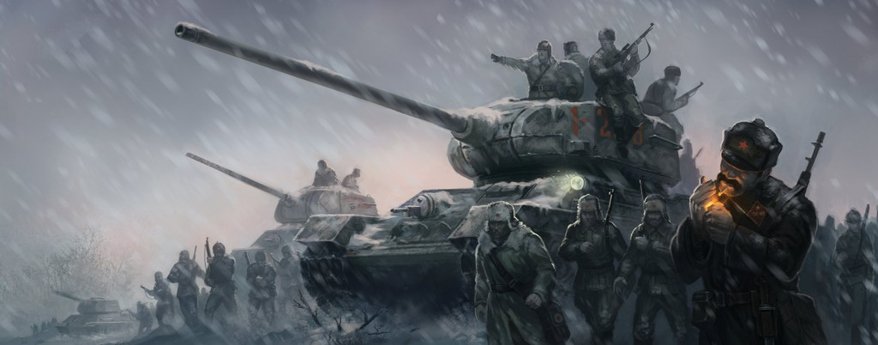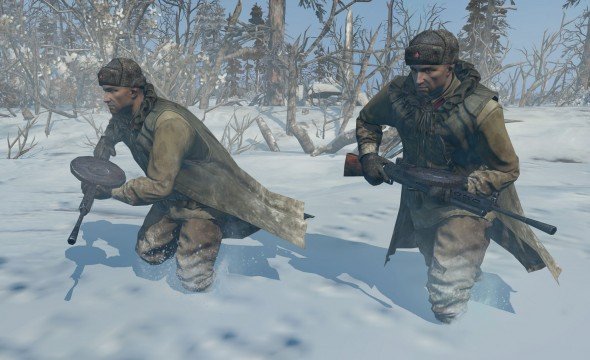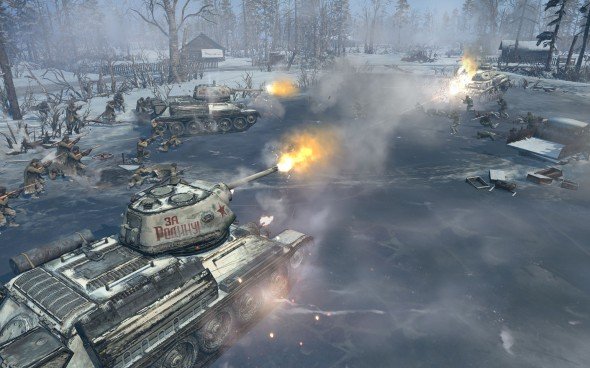Company of Heroes 2 preview

This preview originally appeared in issue 240 of PCG UK.
When Hitler's Germany invaded the Soviet Union in 1941, he caught Stalin's armies unprepared. To avoid being trapped behind enemy lines, Soviet soldiers, civilians and entire industries retreated, falling back further east. Fearing the Nazi's swift and relentless progress towards Moscow, Stalin issued Order 227. “Not one step back,” it said. Now any retreating Soviet soldier would be shot by his own side.
During my time with Relic, the team stopped just short of threatening themselves with guns, but they're similarly resolute that Company of Heroes won't take any backward steps. If you've forgotten exactly why that might be a challenge, consider that Company of Heroes' 94% review in PC Gamer remains the highest score we've ever given an RTS.
Unlike Stalin, Relic are anything but unprepared for the challenge. They've spent the six years since that first game's Saving Private Ryan-inspired tour of Western Europe planning how to better it. Now they think they know how. Company of Heroes is heading to the Eastern Front, to put players in control of the Soviet army during the largest and bloodiest battles of World War II. This raises the question: how do you build a sequel to the best-rated real-time strategy game of all time?
Step one: make it fresh. When the first game came out in 2006, gamers were already fatigued from the onslaught of WWII-set titles. Since then, first-person shooters have moved on, but people are no less wary of a return to the fields of France.

That's where the Eastern Front comes in. While games have ventured towards Moscow before – notably the Men of War series – Relic feel there's still room for their own interpretation. For one thing, they're keen to emphasise the scale of these battles.
The famed Normandy beach landing that kicked off Saving Private Ryan, Medal of Honor: Allied Assault and the first Company of Heroes? “That was the 23rd bloodiest battle of World War II,” says Quinn Duffy, Company of Heroes 2's lead designer. In comparison, “13 of the 15 bloodiest battles happened on the Eastern Front,” he says.
The biggest gaming news, reviews and hardware deals
Keep up to date with the most important stories and the best deals, as picked by the PC Gamer team.
Company of Heroes 2 will begin in 1941, with the Soviets on the back foot after 600,000 soldiers, 3,000 tanks, 7,000 cannons and 3,000 airplanes have poured into the Soviet Union. Within months, almost half of the Soviet Union's 190 million population is behind enemy lines.
Relic are cagey on exact narrative details, but the story of the war will be told through the eyes of a war correspondent as he travels through the Eastern Front, reporting on battles and “the failures of communist ideology,” says Quinn. The player's role will be to lead the Russians to fight back, from the defence of Stalingrad towards ultimate victory in Berlin.

The first Company of Heroes followed the Allied forces from the Normandy beach landing through to the capture of Berlin. What made it remarkable, then and now, was its ability to render those battles with the same cinematic flair as firstperson shooters like Medal of Honor, but with greater tactical depth than any other RTS.
Success in CoH is about more than left-click command, right-click conquer. Without traditional base building and resource gathering, beating the Nazis required genuine squad tactics: taking cover in hedgerows, flanking enemy positions, and cannily deploying grenades, artillery and equipment to outsmart smart enemies.
If you're controlling a tank in Company of Heroes and there's a building between you and your enemy, you can smash your way through that building. If a grenade explodes among your soldiers, those men will come apart, pinwheeling through the air. Company of Heroes found a spot on the scale between intelligence and bombast.
Company of Heroes II is loading. With Matthew Berger, one of the game's other designers, at the controls, Quinn is going to talk me through a mission called 'Rzhev Meatgrinder'. It was fought in the winter of 1942, and it's one of WWII's lesser known battles. It led to the deaths of a staggering 1 million Soviet soldiers.

